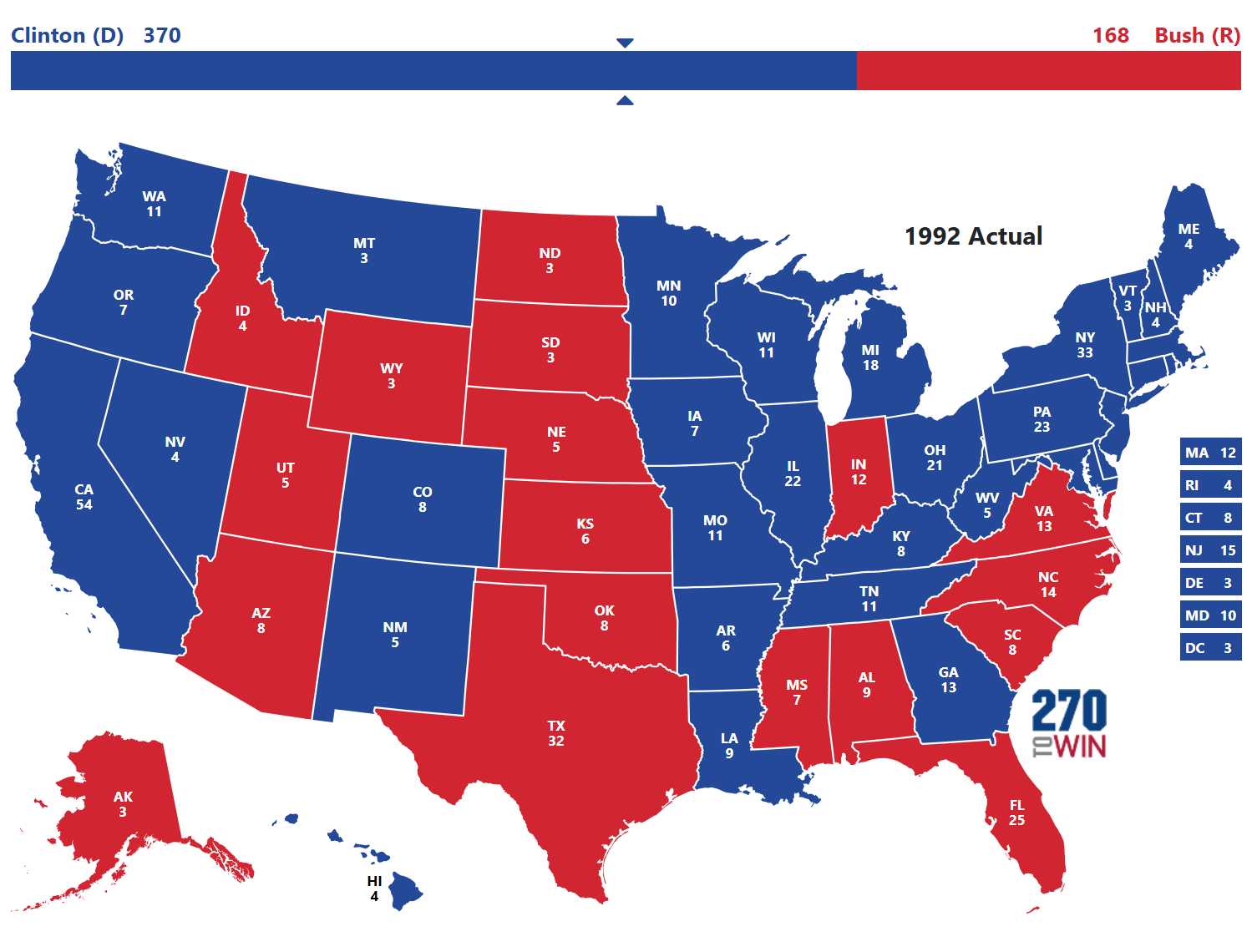Prior to the 1992 election, Bush’s popularity after his victory in The Gulf War and his successes with the dissolution of the Soviet Union was generally quite high, but for Bush, the start of his campaign was still shaky. Bush was challenged by conservative Pat Buchanan for the Republican nomination because of the faltering economy. Bush’s campaign was wounded by his promise in the 1988 election that voters should “read my lips: no new taxes”, but facing a recession in 1990, Bush was forced to break his promise and raise taxes to save the economy. His public image was wounded, he lost many of his conservatives supporters from the previous election, and in turn, his victory over Buchanan was much closer than it could have been. (Buchanan winning 37 percent of the New Hampshire primary). Bush, running with vice president Dan Quayle, faced difficulties due to his broken promise of “no new taxes”.
Clinton, as well, started his campaign off on not the best of notes after being accused of being unfaithful to his wife with Gennifer Flowers. The 12-year affair with the Arkansas woman almost put his campaign to an end, but Clinton would come back, despite losing the New Hampshire primary, to beat Paul Tsongas and Jerry Brown after a intense and close race. After gaining the Democratic Party’s nomination, Clinton continued his campaign to appeal to the concerns of the average American, and picked up Tennessee Senator Al Gore as his running mate. Clinton bashed Bush’s economic policies, coining the phrase “It’s the economy, stupid” as their campaign slogan.
Ross Perot, the Independent candidate, was a self made billionaire that announced that he would run for presidency if supporters filed petitions to enable him to voted for in all 50 states. Early polls showed Perot in the lead due to the drama over Clinton’s personal scandals and Bush’s difficulties with America’s faltering economy. However, in July, as the Democratic National Convention drew near and Clinton showing stronger than ever, Perot suddenly dropped from the race. A few months later Perot rejoined the contest with his primary goals to reduce the national debt, and discredit NAFTA, and was able to regain much of his initial support and election day grew near.
In the end, Clinton clinched the popular vote with 43%, Bush with 37.4%, and Perot with 18.9%. Even with Perot winning the highest percentage of the popular vote in 80 years (since Theodore Roosevelt), he was unable to win an electoral college vote. With Clinton winning 370 electoral votes to Bush’s 168, Clinton was signed in as the 42nd president of the United States.
https://www.270towin.com/1992_Election/
https://www.britannica.com/event/United-States-presidential-election-of-1992
http://www.historycentral.com/elections/1992.html
http://www.presidency.ucsb.edu/showelection.php?year=1992

I really liked your post and found it fascinating to read about this more in depth discussion of the 1992 election. What's really interesting is that the way the scandal surrounding Bill Clinton blew away. Simply said, it was because the people of the United States were not as deeply shocked by sexual relationships and the personal choices of individuals. As the sexual revolution allowed it to be more common to accept that people could do what they wanted with their body, people's perceptions overall changed. In such, the reaction that people had towards the scandal was a lot less than it would have been in previous years. What we see as that the 1992 election not only represented a turning point as a new president came to power, but also because it represented how cultural views were changing.
ReplyDeleteSOURCE : https://www.cnn.com/2016/04/06/opinions/zelizer-presidential-election-campaign-scandals-bill-clinton/index.html
This was a really informative post about how manipulating facts can have significant political implications. One interesting point you bring up is the fact that Bush broke his promise of "no new taxes." Looking into the past and the present, we see that raising taxes is usually inevitable. For example, Ronald Reagan raised taxes eleven times over the course of his presidency (despite being a hardline conservative). Furthermore, George W. Bush, who signed a tax cut bill, ended up raising taxes for Americans living abroad and for teenagers with college savings funds. Do you think these are signs that a nation simply cannot function without taxation? Do you think any president can say "no new taxes" and keep their promise without tanking the country?
ReplyDeletehttps://thinkprogress.org/with-one-pen-stroke-bush-raises-taxes-twice-2e6adcfb8e76/
https://thinkprogress.org/10-things-conservatives-dont-want-you-to-know-about-ronald-reagan-7a87723a4f68/
I like the how you give background information showing the way that Bush's popularity fell before the election even started. This helped me get a better understanding of why the 1992 election turned out the way it did. I also think the way you organaized your paragraphs with each paragraph showing a different nominee, was a strong method in displaying a clear idea of what happened to the reader.
ReplyDelete